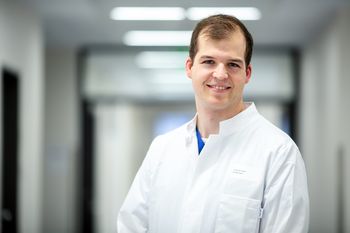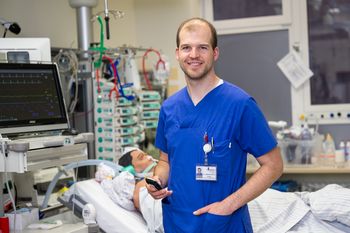Portraits
Portraits
Doctors made in Oldenburg

Six years after it was founded, the human medicine degree programme at the University of Oldenburg has its first graduates. The four young doctors include Johannes Grone, who is completing his specialist training in Oldenburg.
He approaches us in the hospital corridor: tall, open-faced, with a friendly smile. Johannes Grone clearly feels at home in his new working environment at Oldenburg Hospital. Just a few months ago, he was one of the first four medical students to graduate from the European Medical School Oldenburg-Groningen (EMS). "I'm relieved and happy that I did so well in my studies - and now I'm still a little nervous about what everyday life as a doctor really entails," says the 29-year-old native of Göttingen, describing his current emotional state.
Clinic Director Prof. Dr Andreas Weyland is delighted that Grone has decided to complete his specialist training at the University Clinic for Anaesthesiology, Intensive Care Medicine, Emergency Medicine and Pain Therapy (AINS) at the hospital and thus remain in Oldenburg: "He will work with many colleagues over the next five years and get to know all facets of our specialist field." Weyland is certain that the young doctor is well prepared thanks to his studies. "Johannes Grone has already proven that he is resilient, willing to learn and a team player. He has also internalised a patient-oriented approach at the EMS. These are all essential prerequisites for working at our clinic."
Grone came to the University of Oldenburg in 2012 and got the last available place to study medicine at the School V - School of Medicine and Health Sciences - without an A-level. He had plenty of experience in his luggage - gained as a community service volunteer in the ambulance service and while working as a paramedic. Due to his outstanding credits, he received a Deutschlandstipendium scholarship five times and was always among the best. Together with his 39 fellow students, Grone always saw himself as part of the bigger picture: "We had the chance to help shape the degree programme. That's unique," he says, and his enthusiasm is palpable. "Over the next few years, we'll be able to show that we've become good doctors." The young doctor particularly appreciated the personal support and guidance he received from the doctors and head physicians in the clinics. The practice-orientated teaching concept typical of Oldenburg University Medicine was also important to him. "Even in the first years of our studies, we were sometimes treated like doctors in their practical year. That was very respectful. We also had the opportunity to actively participate very early on and had direct contact with patients."
For Andreas Weyland, these special "Oldenburg advantages" are based on the good combination of theoretical principles and practical and communicative skills in the model degree programme. However, it took time to develop this. It is therefore not surprising that Grone and his fellow students from the first cohort found the degree programme and the compulsory year at the University Medical Centre Groningen (UMCG) to be a real challenge in many respects. "Many structures still had to be established and processes were not yet well-rehearsed at the beginning." Today, he can also take something away from this pioneering role: "I was one of the first to gain practical experience in Groningen. That definitely helped me on my way." Here and there, he was able to gradually feel his way towards being a doctor, which he found to be a great advantage.
The freshly qualified doctor is no longer feeling his way around, the workload remains high. In addition to training as a specialist, Grone is currently working on his doctoral thesis, which he is writing at the University Clinic for General and Visceral Surgery at the Pius Hospital in Oldenburg. He is also still involved in voluntary work, for example with the Red Cross as a doctor on call or with the volunteer fire brigade. He now calls Oldenburg his home, and he still feels very close to the School. "I can imagine being involved in teaching at some point. I would also like to research anaesthesiology or emergency medicine topics one day," says Grone. The degree programme, which has a lot of research-based learning content, will also have prepared him well for this.
Where the state of emergency is routine

Twelve years after starting his medical studies, Johannes Grone is one of the first Oldenburg alumni to complete his specialist training. Born in Göttingen, he has remained loyal to University Medicine Oldenburg and has been working at the University Clinic for Anaesthesiology, Intensive Care Medicine, Emergency Medicine and Pain Therapy (AINS) at Klinikum Oldenburg since graduating - recently as a specialist in anaesthesiology. He loves one thing above all about his job: the variety.
Today as an emergency doctor on the ambulance, next week as an anaesthesiologist during an operation, then as an attending physician on the intensive care unit - to call Johannes Grone's job varied would be an understatement. Sometimes his face also flickers on the screen when, for example, the community paramedics call for support via the telemedicine centre, which is also operated at the university hospital. Anyone who has to be transferred to another hospital as an intensive care patient in the north-west of Lower Saxony could also meet Johannes Grone. He regularly accompanies the journeys coordinated centrally by the Lower Saxony Intensive Care Transfer Service and monitors ventilation en route, for example. "There's just more going on here and that's what makes the difference," says Grone.
Like many first-year medical students in Oldenburg, Grone started his studies with previous experience: after completing his civilian service with the ambulance service, he trained as a paramedic. "Working in emergency medicine in all weathers with my colleagues from the ambulance service - that still suits me very well today," says Grone. There is no corresponding specialisation in Germany, nor is there one for intensive care medicine. Doctors acquire the necessary knowledge for this through so-called additional further education and Grone has also had the additional qualification in emergency medicine for some time.
However, the examination to become a specialist in anaesthesiology in spring 2024 was a special milestone: it marked the end of his five-year training period. He only learned how to supervise head surgery at the Protestant Hospital and the special features of anaesthesia for lung surgery at a hospital in Kassel. He completed all other wards at Oldenburg Hospital. "I already felt that I was in good hands here during my practical year," explains Grone.
Prof Dr Simon Schäfer, Director of the University Clinic for AINS, is delighted that the 35-year-old is now part of his team. "For cutting-edge university medicine, our own students are the ideal young talent to train as medical specialists and to further qualify them clinically and scientifically," he says. They are highly committed to getting involved in teaching and passing on their knowledge to the next generation. This is particularly true for Grone. "He is not only involved in the clinic, but also in the training of students and junior doctors. He is also an integral part of our new anaesthesiology simulation centre, which was established in 2024," says Schäfer.
For the upcoming simulation week, Grone has just equipped a simulation room with colleagues in the hospital's intensive care unit 113. In what at first glance appears to be an ordinary intensive care unit room, a life-size mannequin lies in bed instead of a real patient. It is surrounded by all kinds of monitoring devices. Various scenarios can be triggered via software, allowing doctors on the ward and medical students to practise intensive care scenarios or life-threatening situations. "For example, if someone has to perform a tracheotomy, which is extremely rare, they have already done it in the simulation centre."
Johannes Grone has often experienced that practical experience has the greatest learning effect in his six years of work since completing his degree. "At the beginning, you clearly realise how different everyday clinical practice is compared to studying," says Grone. "But you get into it quickly and I had my first high early on and the feeling that I could master any critical situation." In reality, however, you are confronted with the next difficult situation on the intensive care unit so quickly that you are immediately brought back down to earth. In Grone's early years, this included the COVID pandemic, which pushed intensive care units worldwide to their limits with numerous patients requiring ventilation. "The best moment of my professional life so far was when we realised that the coronavirus wave was clearly levelling off and we no longer had a ward full of critically ill patients on artificial lungs," he says.
Despite the constant new challenges, Grone has developed a certain routine over the years. Today, he says, nothing can upset him any more. Respiratory distress, circulatory failure, cardiac arrest - critical situations are part of everyday life on the intensive care unit and dealing with at least some of them is normality. "Nevertheless, there are still sometimes moments when I feel like I'm on my first day and think I still know far too little," says Grone. That's why he is already working on his next additional training programme: "Special intensive care medicine".
